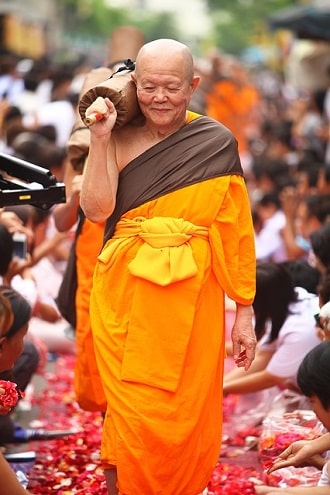Dharma
All Buddhist teachings and practice come under the heading of Dharma, which means Truth and the path to Truth. The word Dharma also means “phenomena,” and in this way we can consider everything to be within the sphere of the teachings. All outer and inner phenomena, the mind and its surrounding environment, are understood to be inseparable and interdependent.
Buddhism as an Ecological Religion or a Religious Ecology
Many Buddhist monks such as His Holiness the Dalai Lama, Venerable Thich Nhat Hanh, Venerable Kim Teng, and Venerable Phra Phrachak emphasize the natural relationship between deep ecology and Buddhism.
According to the Vietnamese monk Venerable Thich Nhat Hanh:
Buddhists believe that the reality of the interconnectedness of human beings, society and Nature will reveal itself more and more to us as we gradually recover—as we gradually cease to be possessed by anxiety, fear, and the dispersion of the mind.
Venerable Thich Nhat Hanh
In order to protect the environment we must protect ourselves. We protect ourselves by opposing selfishness with generosity, ignorance with wisdom, and hatred with loving kindness.
Nature as a Way of Life
The Buddha commended frugality as a virtue in its own right. Skillful living avoids waste and we should try to recycle as much as we can. Buddhism advocates a simple, gentle, nonaggressive attitude toward nature—reverence for all forms of nature must be cultivated.
Buddha used examples from nature to teach. In his stories the plant and animal worlds are treated as part of our inheritance, even as part of ourselves. As Krishnamurti said, “We are the world, the world is us.” By starting to look at ourselves and the lives we are living we may come to appreciate that the real solution to the environmental crisis begins with us.
The Right Actions
If we are going to save this planet we need to seek a new ecological order, to look at the life we lead and then work together for the benefit of all; unless we work together no solution can be found. By moving away from self-centeredness, sharing wealth more, being more responsible for ourselves, and agreeing to live more simply, we can help decrease much of the suffering in the world. As the Indian philosopher Nagarjuna said, “Things derive their being and nature by mutual dependence and are nothing in themselves.”
This is an abridged version of the Buddhist statement prepared by Kevin Fossey, Buddhist educator and representative of Engaged Buddhism in Europe; Somdech Preah Maha Ghosananda, Patriarch of Cambodian Buddhism; His Excellency Sri Kushok Bakula, 20th Reincarnation of the Buddha’s Disciple Bakula, head of Ladakhi Buddhism, and initial rebuilder of Mongolian Buddhism; and Venerable Nhem Kim Teng, Patriarch of Vietnamese Buddhism.
The original and longer statement can be found here
For a look at other faith’s statements on the environment, please click here.
Copied with permission from Alliance for Religions and Conservation.
ICSD works on a global basis, with current engagement in Africa, the Middle East, North America, and Europe.







